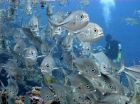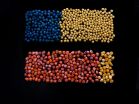Eating eggs reduces risk of type 2 diabetes
2015-04-02
(Press-News.org) Egg consumption may reduce the risk of type 2 diabetes, according to new research from the University of Eastern Finland. The findings were published in American Journal of Clinical Nutrition.
Type 2 diabetes is becoming increasingly widespread throughout the world. Research has shown that lifestyle habits, such as exercise and nutrition, play a crucial role in the development of the disease. In some studies, high-cholesterol diets have been associated with disturbances in glucose metabolism and risk of type 2 diabetes. In contrast, in some experimental studies, the consumption of eggs has led to improved glucose balance, among other things. However, there is no experimental data available on the effects of egg consumption on the incidence of type 2 diabetes. In population-based studies, too, the association between egg consumption and type 2 diabetes has been investigated only scarcely, and the findings have been inconclusive. Egg consumption has either been associated with an elevated risk, or no association has been found.
The dietary habits of 2,332 men aged between 42 and 60 years were assessed at the baseline of the Kuopio Ischaemic Heart Disease Risk Factor Study, KIHD, at the University of Eastern Finland in 1984-1989. During a follow-up of 19.3 years, 432 men were diagnosed with type 2 diabetes.
The study found that egg consumption was associated with a lower risk of type 2 diabetes as well as with lower blood glucose levels. Men who ate approximately four eggs per week had a 37 per cent lower risk of type 2 diabetes than men who only ate approximately one egg per week. This association persisted even after possible confounding factors such as physical activity, body mass index, smoking and consumption of fruits and vegetables were taken into consideration. The consumption of more than four eggs did not bring any significant additional benefits.
A possible explanation is that unlike in many other populations, egg consumption in Finland is not strongly associated with unhealthy lifestyle habits such as smoking, low physical activity or consumption of processed meats. In addition to cholesterol, eggs contain many beneficial nutrients that can have an effect on, for example, glucose metabolism and low-grade inflammation, and thus lower the risk of type 2 diabetes. The study also suggests that the overall health effects of foods are difficult to anticipate based on an individual nutrient such as cholesterol alone. Indeed, instead of focusing on individual nutrients, nutrition research has increasingly focused on the health effects of whole foods and diets over the past few years.
INFORMATION:
For further information, please contact:
Jyrki Virtanen, PhD, adjunct professor of nutritional epidemiology, University of Eastern Finland, Institute of Public Health and Clinical Nutrition, tel. +358294454542, jyrki.virtanen@uef.fi
Egg consumption and risk of incident type 2 diabetes in men: The Kuopio Ischaemic Heart Disease Risk Factor Study. Jyrki K. Virtanen, Jaakko Mursu, Tomi-Pekka Tuomainen, Heli E.K. Virtanen, Sari Voutilainen . American Journal of Clinical Nutrition. Published online ahead of print, April 2, 2015. Link: http://ajcn.nutrition.org/content/early/2015/04/01/ajcn.114.104109.abstract
ELSE PRESS RELEASES FROM THIS DATE:
2015-04-02
An illuminating study compares the willingness of stage IV cancer patients, and their caregivers; to pay to extend their lives by one year against that of other end-of-life improvements. The research, led by members of the Lien Centre for Palliative Care (LCPC) and collaborators from the National Cancer Centre Singapore, was recently published in the journal, Palliative Medicine.
Patients with advanced cancer or other life limiting illnesses often have to consider how much money they are willing to spend on high cost treatments that result in only moderate improvements ...
2015-04-02
University of Adelaide researchers have shown there are two critical windows during the developmental pathway to adulthood when exposure to junk food is most harmful, particularly for female offspring.
This work leads on from earlier findings which showed that mothers who eat junk food while pregnant are programming their babies to be addicted to a high fat, high sugar diet by the time they are weaned.
Their latest laboratory studies reveal there may be a chance to turn around this junk food addiction in two critical windows--equating to late pregnancy and in adolescence ...
2015-04-02
The use of technology in daily life is getting easier all the time as people accumulate knowledge and skills in information and communications technology. However, the most important thing in developing health care services, for example, is to take into account people's day to day lives and their subjective experience of the utility of using services. For example, people's previous bad experience of using a service is reflected for a long time in their use of the service in the future, and thus the dissemination of new service models is a lot slower than might be imagined. ...
2015-04-02
DARIEN, IL - A new study suggests that symptoms of depression and insomnia are the strongest predictors of having frequent nightmares.
Results show that 3.9 percent of participants reported having frequent nightmares during the previous 30 days, including 4.8 percent of women and 2.9 percent of men. Frequent nightmares were reported by 28.4 percent of participants with severe depressive symptoms and 17.1 percent of those with frequent insomnia. Further analysis that adjusted for potential confounders found that the strongest independent risk factors for nightmares were ...
2015-04-02
Bethesda, MD (April 2, 2015) -- Non-alcoholic steatohepatitis (NASH), the more severe form of non-alcoholic fatty liver disease (NAFLD) that can progress to liver fibrosis and cirrhosis, is associated with leakiness of the intestinal wall, which in turn may worsen liver disease, according to research1 published in Cellular and Molecular Gastroenterology and Hepatology, the new basic science journal of the American Gastroenterological Association.
"Our study strengthens the clinical association between intestinal permeability and NASH, although we were unable to identify ...
2015-04-02
Accurate blood pressure measurement (BP) is fundamental to the early diagnosis of hypertensive disorders in pregnancy, says a review published 1 April, 2015, in The Obstetrician & Gynaecologist (TOG).
The diagnosis and management of hypertensive disorders in pregnancy, as well as obstetric haemorrhage, sepsis and safe abortion, are guided in part by the measurement of BP. These conditions contribute to more than half of all maternal deaths globally, so the accuracy of BP measurement is vital, the review concludes.
The review explains that BP monitoring is the most ...
2015-04-02
BATON ROUGE - LSU Psychology Professor Megan H. Papesh was part of a research team whose study appeared in the online-first edition of the Journal of Neuroscience on Wednesday, April 1.
The research, jointly conducted by scientists from the Barrow Neurological Institute and Arizona State University, involves recording single-neuron activity in the brains of epilepsy patients who require electrodes implanted to monitor seizures. With the electrodes in place, processes such as perception and memory can be studied at the level of individual neurons.
The research focused ...
2015-04-02
As man-made threats to coral reefs mount and interest in conserving reef ecosystems grows, scientists have turned to studying extremely remote and uninhabited reefs in an effort to understand what coral reefs would be like in the absence of humans. A number of islands and atolls in the Pacific Ocean remain virtually untouched by human influence, situated hundreds of kilometers from the nearest human populations.
A study published today by scientists at the University of Hawai'i at Mānoa (UHM) School of Ocean and Earth Science and Technology (SOEST), the National ...
2015-04-02
MADISON, Wis. - Clearing grasslands to make way for biofuels may seem counterproductive, but University of Wisconsin-Madison researchers show in a study today (April 2, 2015) that crops, including the corn and soy commonly used for biofuels, expanded onto 7 million acres of new land in the U.S. over a recent four-year period, replacing millions of acres of grasslands.
The study -- from UW-Madison graduate student Tyler Lark, geography Professor Holly Gibbs, and postdoctoral researcher Meghan Salmon -- is published in the journal Environmental Research Letters and addresses ...
2015-04-02
Use of a class of insecticides, called neonicotinoids, increased dramatically in the mid-2000s and was driven almost entirely by the use of corn and soybean seeds treated with the pesticides, according to researchers at Penn State.
"Previous studies suggested that the percentage of corn acres treated with insecticides decreased during the 2000s, but once we took seed treatments into account we found the opposite pattern," said Margaret Douglas, graduate student in entomology. "Our results show that application of neonicotinoids to seed of corn and soybeans has driven ...
LAST 30 PRESS RELEASES:
[Press-News.org] Eating eggs reduces risk of type 2 diabetes

